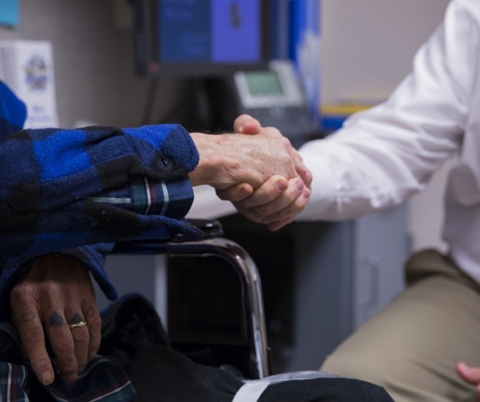REGAIN: Roadmap for Evaluating Goals in Advanced Illness Navigation (2022-2023)
Patients who are facing a serious illness must make complex healthcare decisions regarding treatment options, quality of life considerations and life expectancy. Patients who lack access to open, accurate and empathetic communication about their goals often receive treatment that is overly aggressive and costly, creating financial burdens for them and their families. Poor consideration of a patient’s perspective may lead to an overall worsened quality of life due to unwanted tests and/or treatments.
Goals of care conversations (GOCC) can promote care that is concordant with patients’ values and medical realities. The aim of this project was to identify provider-perceived barriers to implementing GOCC to develop future interventions targeted to improve the frequency and quality of these conversations.
In collaboration with Duke Health’s Center for Palliative Care, this project team interviewed palliative care providers to understand what differentiates this field from hospice and end-of-life care. The team then conducted virtual focus group interviews of 12 providers — including nurses, social workers and doctors across different departments — to understand barriers to effective GOCC.
The team identified the following themes: 1) time constraints, 2) electronic health records (EHR), 3) social determinants of health (SDOH), 4) ineffective communication, 5) difficulty coordinating care, 6) emotional burden, and 7) lack of formal training. GOCC benefit from longer time, as it facilitates a rapport between provider and patient, and allows patients to feel comfortable sharing their goals and values. SDOH factors can influence patient trust in the health system and access to adequate care. Documenting GOCC also can contribute to physician burnout; though documentation is a helpful resource to track a patient’s values, providers often feel burdened by the sheer amount of time it demands.
Timing
Fall 2022 – Spring 2023
Team Outputs
Helping Patients Navigate Complex Healthcare Decisions (2023 Fortin Foundation Bass Connections Virtual Showcase)
Improving Goals of Care Conversations at DUHS (poster by David Casarett, Preya Paltanwale, Haripriya Dukkipati, Julia Gambino, Avery Garmon, Elissa Gorman, Lauren Howard, Daniel Lee, Nikhita Nanduri, Sai Rachakonda, Astha Ray and Nikki Daniels, presented at Fortin Foundation Bass Connections Showcase, April 19, 2023)
The Role of Communication in the Physical Health of Cancer Patients (poster by Astha Ray, Karena Leo, Katherine Ramos and Laura Porter)
Affective Expressions and Mental Health Outcomes Among Couples Coping with Cancer (poster by Lauren Howard, Daniel Lee, Karena Leo, Laura Porter and Katherine Ramos)
Reflection
This Team in the News
Meet the Members of the 2022-2023 Student Advisory Council
See related teams, Developing a Roadmap for Goals of Care Conversations at Duke Health (2023-2024) and REGAIN: Roadmap for Evaluating Goals in Advanced Illness Navigation (2021-2022).
Image: Patient care, courtesy of Duke Center for Palliative Care

Team Leaders
- David Casarett, School of Medicine-Medicine: General Internal Medicine
- Monica Lemmon, School of Medicine-Pediatrics: Neurology
/graduate Team Members
-
Preya Paltanwale, Master of Engineering Mgmt-MEG
/undergraduate Team Members
-
Nikki Daniels, English (AB)
-
Haripriya Dukkipati, Biology (BS)
-
Julia Gambino, Biology (BS)
-
Avery Garmon, Psychology (BS)
-
Elissa Gorman, Neuroscience (BS)
-
Lauren Howard, Neuroscience (AB)
-
Astha Ray, Biology (BS)
-
Daniel Lee, Biology (BS)
-
Sai Rachakonda, Program II (AB)
-
Nikhita Nanduri, Neuroscience (BS)
/yfaculty/staff Team Members
-
Sharla Rent, School of Medicine-Pediatrics: Neonatology
-
Simran Bansal, School of Medicine-Pediatrics: Neurology
-
Katherine Ramos, School of Medicine-Psychiatry: Behavioral Medicine
-
Laura Porter, School of Medicine-Psychiatry and Behavioral Sciences
-
Jessica Ma, School of Medicine-Medicine: General Internal Medicine
-
Thomas Leblanc, School of Medicine-Medicine: Hematology
-
Brystana Kaufman, Fuqua School of Business-Health Sector Management Program
-
Sharron Docherty, School of Nursing
